

Two per cent for a wealthier China. The Chinese government’s announcement that the yuan will be allowed to trade within a wider band starting this week is a major step toward creating a more modern Chinese economy.
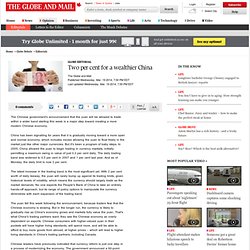
China has been signalling for years that it is gradually moving toward a more open and normal economy, which includes moves allowing the yuan to float freely in the market just like other major currencies. But it’s been a program of baby steps. In 2005, China allowed the yuan to begin trading in currency markets, initially permitting a maximum swing in value of just 0.3 per cent daily. The daily trading band was widened to 0.5 per cent in 2007 and 1 per cent last year. And as of Monday, the daily limit is now 2 per cent.
Is China’s hunger for the globe’s natural resources benign or nefarious? What does China want?
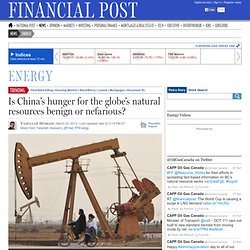
In a new book, Elizabeth Economy and Michael Levi, senior fellows at Washington-based Council on Foreign Relations, examine China’s relentless search for natural resource assets. Financial Post’s Yadullah Hussain spoke to Michael Levi on how Canada fits in with China’s global resource quest and North America’s deep-seated fears about Beijing’s designs to gain global political influence through resource investments. Following is an edited transcript of their conversation. HandoutBy All Means Necessary, by Elizabeth C. Economy and Michael Levi.
Xi Jinping and Social Media: Harnessing the People’s Voice. China’s president uses social media to attract public support, while cracking down on social media users.
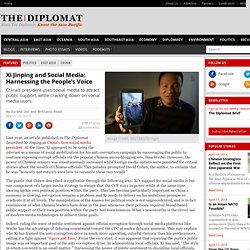
By Su-Mei Ooi and Brittanie Redd for The Diplomat March 20, 2014 Facebook206 Twitter58. Chinese Foreign Policy: A New Era Dawns. As its economic clout grows, Beijing is forging its own path in international relations.
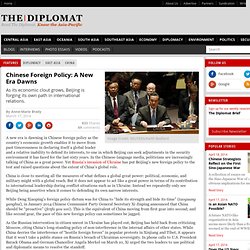
A new era is dawning in Chinese foreign policy as the country’s economic growth enables it to move from past timorousness in declaring itself a global leader and a relative inability to defend its interests, to one in which Beijing can seek adjustments in the security environment it has faced for the last sixty years. In the Chinese-language media, politicians are increasingly talking of China as a great power. Education - China’s most important economic weapon. Authors: Eva Huang, John Benson & Ying Zhu, University of South Australia The Chinese education sector is the largest globally.
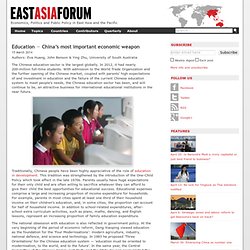
In 2012, it had nearly 200-million full-time students. With admission to the World Trade Organization and the further opening of the Chinese market, coupled with parents’ high expectations of and investment in education and the failure of the current Chinese education system to meet people’s needs, the Chinese education sector has been, and will continue to be, an attractive business for international educational institutions in the near future.
Traditionally, Chinese people have been highly appreciative of the role of education in development. Greening China’s power brings down cost of renewable energy for all. Chinese tourists wearing face masks visit Tiananmen Square as heavy air pollution shrouds Beijing in February.
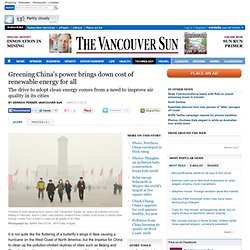
And in China, said industry analyst Ethan Zindler, a big driver to adopt clean energy comes from a need to clean up air quality in its cities. Photograph by: MARK RALSTON , AFP/Getty Images. China embraces market forces. Updated: 2014-03-04 12:39 By Zhang Yang in New York (China Daily USA) China is ready to give the market the "decisive" role in resource allocation in order to increase productivity, said Zheng Xinli, a member of thedraftinggroup for China's reform plans, in New York on Monday.
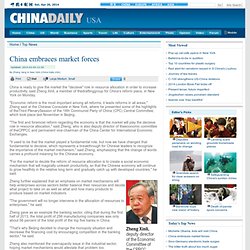
"Economic reform is the most important among all reforms, it leads reforms in all areas," Zheng said at the Chinese Consulate in New York, where he presented some of the highlights of theThird PlenarySession of the 18th Communist Party of China (CPC) Central Committee, which took place last November in Beijing. "The first and foremost reform regarding the economy is that the market will play the decisive role in resource allocation," said Zheng, who is also deputy director of theeconomic committee of theCPPCC and permanent vice-chairman of the China Center for International Economic Exchanges. China issues report on US human rights. BEIJING - China on Friday responded to the United States criticism and irresponsible remarks of its human rights situation by publishing its own report on the US human rights issues.
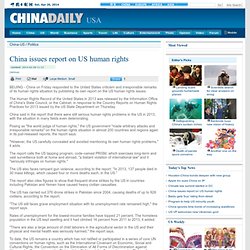
The Human Rights Record of the United States in 2013 was released by the Information Office of China's State Council, or the Cabinet, in response to the Country Reports on Human Rights Practices for 2013 issued by the US State Department on Thursday. China said in the report that there were still serious human rights problems in the US in 2013, with the situation in many fields even deteriorating. Posing as "the world judge of human rights," the US government "made arbitrary attacks and irresponsible remarks" on the human rights situation in almost 200 countries and regions again in its just-released reports, the report says.
"However, the US carefully concealed and avoided mentioning its own human rights problems," it adds. The US also faces rampant gun violence, according to the report. Transcript: What Canada can learn from China’s new green focus. KARL MOORE – This is Karl Moore of the Desautels Faculty of Management at McGill University, talking management for The Globe and Mail.
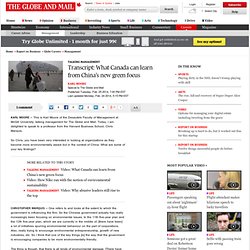
Today, I am delighted to speak to a professor from the Harvard Business School, Chris Marquis. So Chris, you have been very interested in looking at organizations as they become more environmentally aware but in the context of China. What are some of your key findings? CHRISTOPHER MARQUIS – One refers to and looks at the extent to which the government is influencing the firm. So the Chinese government actually has really increasingly been focusing on environmental issues. The thing is though, that there is all kinds of environmental damage. KARL MOORE – Is there a lesson for governments in Europe, the U.S. or Canada, from what China has done?
CHRISTOPHER MARQUIS – Being able to focus attention on certain issues is tremendously important. Americans view China 'mostly unfavorably': poll. Updated: 2014-02-21 13:16 By Amy He in New York (China Daily USA) A new Gallup poll shows that more than 50 percent of Americans see China as "mostly unfavorable," attitudes that are nearly unchanged from those in early 2013, despite China's announcements of economic and social reforms at the end of last year.
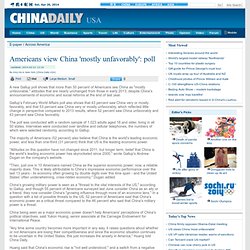
Gallup's February World Affairs poll also shows that 43 percent saw China very or mostly favorably, and that 53 percent saw China very or mostly unfavorably, which reflected little change in perspective compared to 2013 results, where 52 percent saw China unfavorably and 43 percent saw China favorably. China’s Big Overseas Spending Spree. While the Chinese government uses its vast financial resources to secure Beijing’s interests abroad, wealthy private Chinese citizens and corporations are on an international buying frenzy. China’s ever-increasing purchasing power is influencing every region of the globe, with some striking parallels between its overseas acquisitions and Japan’s international investments in the 1980s.
However, China’s political system, a foreign policy that is often at odds with Western interests, and (counter-intuitively) its relative poverty mean that China’s global shopping spree may effect the balance of global politics in a way Japan never could. Chinese recycling mogul Chen Guangbiao’s public intention to buy The New York Times highlighted both the lofty ambitions and the occasional crassness of China’s nouveau riche. While Chen’s over-the-top ego and utter lack of political correctness may seem comical, his ambition to purchase major American media outlets has serious implications. Brendan P. China changing itself and the world after Third Plenum. Author: Yiping Huang, Peking University and ANU Now we can see the full script of what I once called Likonomics, the policy framework of the new Chinese leadership.
The policy document approved by the Third Plenum is indeed very comprehensive, containing reform measures in 60 areas. Two distinctive features stand out, compared with previous reform programs: top-level authority and full market system. Why boyfriend rentals are booming in China (kisses cost extra) - World. Many young people face crushing pressure to show off a sweetheart when they visit family on Lunar New Year, the biggest and longest holiday in China.
It's spurred a growing trend in "rental boyfriends," fake beaus who charge as much as a month’s average salary – and a dollar a pop for hugs. The Chinese even have a phrase to describe a woman who reaches her late twenties without marrying: they call her “leftover woman.” It’s cause for a family crisis. Beijing-based student Zhu Ruisen recently joined the booming trend in 'rental boyfriends' in China. He charges as much as a month's average salary to help women fend off family pressure by posing as a beau. And those who are gay face a similar predicament: homosexuality is very much underground in China. Beijing-based rental boyfriend Zhu Ruisen says the Lunar New Year holiday – which started a few days ago – is a peak time in his line of work. “There is a big demand: many clients have this need,” Zhu said, speaking through a translator. China changing itself and the world after Third Plenum.
Hotline help on way for Chinese abroad. Updated: 2014-01-29 01:35. U.S.-China Relations and the Western Pacific. Maritime assertiveness in 2013 appears to have dashed hopes for a “new kind of great power relations.” By Denny Roy for The Diplomat January 16, 2014 Facebook337. Why China Wants to ‘Strike the Mountain’ and ‘Kill the Chicken’ Understanding two critical strategies for Beijing, one internal and one external. Douglas Goold: Taiwan’s make-believe status quo. Douglas Goold: Taiwan’s make-believe status quo Facebook | Twitter | Email | Instapaper Douglas Goold, National PostMonday, Jan. 6, 2014 Taiwan President Ma Ying-jeou gestures to supporters after winning the presidential elections outside the campaign headquarter in Taipei on January 14, 2012.
AFP PHOTO / Sam YEH What a difference a change in parties and the passage of half a decade can make in one of the world’s flashpoints, as I learned during a recent visit to Taiwan. The forces driving RMB internationalisation. Author: Yu Yongding, CASS. Corruption and Bo Xilai by-products of China’s bigger problem. Authors: Roderic Broadhurst, ANU, and Peng Wang, King’s College London. Beijing 'ready' to launch Mars mission - CHINA. 200 foreigners expelled from Beijing this year. 'Skills list' to attract overseas talent. China’s Foreign Policy Debates. Xi Jinping may have grabbed the APEC Summit limelight, but China still needs to resolve some foreign policy questions. President Obama recently canceled his trips to attend the APEC Summit in Indonesia, the East Asia Summit in Brunei, and his planned visits to the Philippines and Malaysia. In contrast, Chinese President Xi Jinping has concluded visits to Indonesia and Malaysia, and attended the APEC Summit. Plenty of red flags for investors in China’s new nod to free markets.
To continue reading this article, you must be a Globe Unlimited subscriber. World Insider is exclusively available to Globe Unlimited subscribers. Drawing on Globe writers, seasoned international columnists and former diplomats, World Insider offers Globe and Mail subscribers an unrivalled perspective of the world. Whither the Chinese leadership? Author: Richard Rigby, ANU. China's public sector: a different way of working. China's foreign policy dilemma. China invests overseas to develop domestically. Jung Chang. Challenges in China’s next stage of development. Don’t rush Chinese domination. Experts interpret the Chinese Dream. Why Chinese Study the Warring States Period.